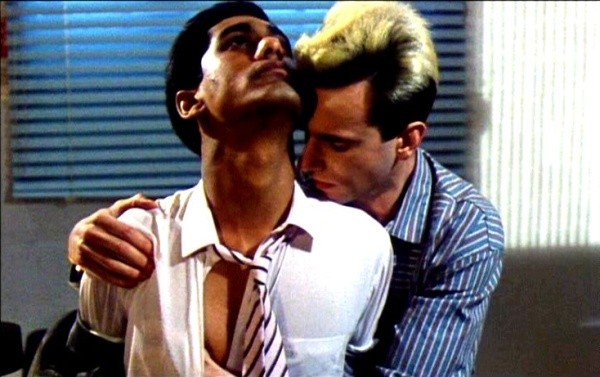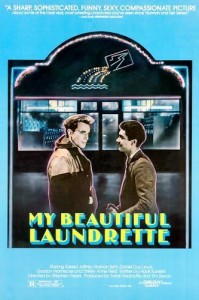Welcome back to 80s Bits, the weekly column in which we explore the best and worst of the Decade of Shame. With guest writers, hidden gems and more, it’s truly, truly, truly outrageous.
[stextbox id=”grey” caption=”My Beautiful Laundrette (1985)” float=”true” align=”right” width=”200″]
Director: Stephen Frears
Writers(s): Hanif Kureishi
Runtime: 97 minutes
Starring: Gordon Warnecke, Daniel Day-Lewis, Saeed Jaffrey, Roshan Seth
Distributor: Mainline Pictures
Country: UK
Rating: Better Than Average Bear (?)
[/stextbox]
My Beautiful Laundrette (1985) directed by Stephen Frears (The Queen, Dangerous Liaisons) is a queer cult classic that once seen will never be forgotten. Based around the Indian community in London the film exploits issues of England in the mid 80s including minority groups, class and race segregation, drugs, poverty and crime.
The story follows Omar (Gordon Warnecke), a dutiful son to father Hussein (Roshan Seth, Indiana Jones and the Temple of Doom) who arranges a job with his uncle Nasser (Saeed Jaffrey) a successful business man. “Try and fix him up with a nice girl, I’m not sure his penis is in working order”. With a burst of ambition an almost mute Omar finds his confidence and blindly strides forward with his laundrette venture assisted with the money (and drugs) of his extended families corrupt side dabbling.
Omar is joined by business partner and love interest Johnny (Daniel Day-Lewis, Gangs of New York, The Last of the Mohicans) who coming from the slums of London decides to make an honest living. Together they build a glamorous laundry palace like no other with luminescent signs, cassette decks, pin ball machines, scenic murals and comfort for all.
Omar idolises Johnny and confidently includes him in all his endeavours without hesitation. There is a power shift and role reversal between the two with Omor becoming Johnny’s “boss”. “I want big money; I’m not going to be beaten down by this country. When we were at school you and your friends kicked me all around the place, and what are you doing now, washing my floors and that’s how I like it. Now get to work…or else you’re fired.”
Sexuality is subtly addressed as an issue throughout the film. During Omar and Johnny’s love scene his Uncle and mistress Rachel (Shirley Anne Field) are seen dancing simultaneously though the mirrored window of the Laundrette. Nasser and Rachel walk in on the lovers who were “Asleep, Uncle. We were shagged out.” At the request of his Uncle, Omar is asked to marry Cousin Tania (Rita Wolf). Tania, initially satisfied with being provided for, soon realises her fate and “would rather drink my own urine”.
The segregation of race, politics, the power of money and relationship dynamics are themes throughout. This is reflected in Johnny’s obedience to Omar and his needs at the expense of his own socialist values. The status of “Pakis” in the British community is portrayed as being overshadowed by the opportunities to make money. This negates any thoughts for the Ali family returning to their home country. Johnny is accepted into the Asian community and as a result is forced to choose between his new shady connections and his socialist homeless drifter past ending in violence.
[stextbox id=”custom”]My Beautiful Laundrette is a film with depth and explores conflicts from a perspective rarely depicted in its day.[/stextbox]





